| Srl | Item |
| 1 |
ID:
127506
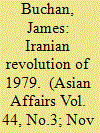

|
|
|
|
|
| Publication |
2013.
|
| Summary/Abstract |
There are plenty of myths about the causes of the Iranian Revolution of 1979. The 1973-1974 rise in the price of crude enabled the Shah to finance his modernisation programme, but as it began to falter, dissent increased. The death of Khomeini's sons made things worse, but it was a fire in a cinema in Abadan which sparked major demonstrations. A new Prime Minister was installed but he failed to get a grip on the situation and Khomeini, by then in France, emerged as the leading opposition figure. The situation steadily deteriorated culminating in the Shah's departure in January 1979 and the melting away of the power of the army. The strategic and other consequences of the revolution were very serious. But that is another story.
|
|
|
|
|
|
|
|
|
|
|
|
|
|
|
|
| 2 |
ID:
127508


|
|
|
|
|
| Publication |
2013.
|
| Summary/Abstract |
The tradition of men dancing in place of women (launda naach) has a chequered history in India. The dancers mostly come from poor families with a disproportionate number from West Bengal. They face significant violence, both at home and in their profession, for so much of identity in India is centred round the family and appropriate roles within the family. Launda naach offers a certain freedom as well as a measure of economic Independence. But it remains a narrow and limited space.
|
|
|
|
|
|
|
|
|
|
|
|
|
|
|
|
| 3 |
ID:
127507
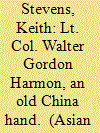

|
|
|
|
|
| Publication |
2013.
|
| Summary/Abstract |
Gordon Harmon was born in China in 1900 and after the First World War served in the Salt Revenue Guards for a number of years. After the outbreak of WWII he was posted in a liaison role to the centre of Chinese government in Chungking. There he worked with Chiang Kai Shek's Nationalist Intelligence Service. But he also had quite close links with Chou En-Lai, who was also in Chungking at that time. The extent of his more general relationship with the Communists is unclear, but he seems to have reported fairly extensively on their plans and intentions. Harmon has left a very detailed record of a conversation with Mao Tse-tung in 1946 which seems to suggest that he had met Mao a few times before.. It was Mao who apparently said to Harmon "I am not interested in Hongkong and I will certainly not allow it to become a bone of contention between your country and mine"
|
|
|
|
|
|
|
|
|
|
|
|
|
|
|
|
| 4 |
ID:
127504


|
|
|
|
|
| Publication |
2013.
|
| Summary/Abstract |
The recent reforms in Myanmar were not brought about by Western sanctions or some contingent event, but rather planned well in advance,. For there is more continuity than change in Myanmar's political system, which is dominated by the practitioners of national power-the army and the bureaucracy. Of course there are new actors, principally Aung San Suu Kyi and the party she leads, the NLD. Yet the reality remains: state security has to be maintained. Rebalancing with ASEAN, India and now the West is helpful in terms of independence vis a vis China. This is not an invitation to the West to attempt to subvert the existing order.
|
|
|
|
|
|
|
|
|
|
|
|
|
|
|
|
| 5 |
ID:
127503
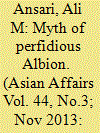

|
|
|
|
|
| Publication |
2013.
|
| Summary/Abstract |
Over the last few years publicly-expressed anti-British sentiment has been on the rise, tapping into a latent Anglophobia in Iranian political culture. Iran's relationship with the British goes back much further than the relationship with the Americans, who benefit from a curious indulgence. During the 19th century, Iran was largely seen through the prism of British interests in India, yet Russia, which loomed large at that time, has also seemingly escaped responsibility for its role. Certainly the advent of oil changed British focus and the confrontation over Anglo-Iranian Oil came to define British-Iranian relations for the modern era. Yet paradoxically, there is, somewhere, a deeper and more complex relationship in which a degree of mutual respect remains.
|
|
|
|
|
|
|
|
|
|
|
|
|
|
|
|
| 6 |
ID:
127505
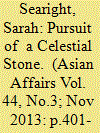

|
|
|
|
|
| Publication |
2013.
|
| Summary/Abstract |
The best Lapis lazuli in the world comes from Afghanistan, from Badakhshan, where it has been mined for over 6,000 years.
Merchants carried lapis to cities all over Mesopotamia and ancient Egypt, where distinctive ornaments have subsequently been excavated. More recently emerged a quite different use of lapis-the grinding of the stone to produce pigment for painting (ultramarine) This technique travelled as much as the stone itself from caves in Asia through wall paintings of the early Middle Ages to the Italian Renaissance and, finally to Titian
|
|
|
|
|
|
|
|
|
|
|
|
|
|
|
|
| 7 |
ID:
127502
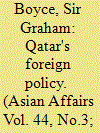

|
|
|
|
|
| Publication |
2013.
|
| Summary/Abstract |
Qatar has only recently emerged as a player in the foreign policy arena. The first sign of what has become a highly distinctive role was the establishment of Al Jazeera, which has changed for ever the way that news media are seen across the Arab world. Qatar then successfully mediated in several conflicts in the region, before playing an active role in the aftermath of the Arab Spring and taking a lead on Libya. Syria poses more of a problem. But Qatar, as a small, rich country in an unpredictable region, now enjoys a high level of global recognition as an independent state.
|
|
|
|
|
|
|
|
|
|
|
|
|
|
|
|